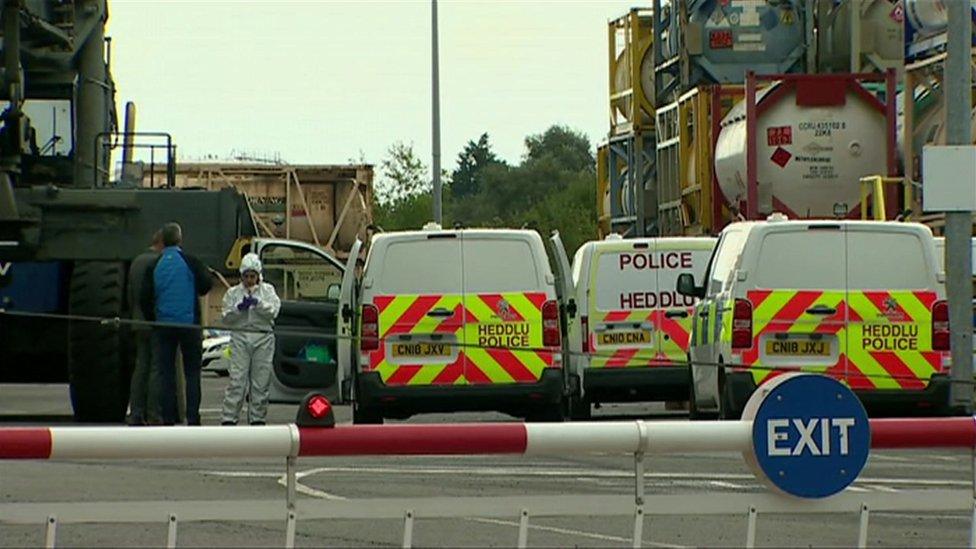Harry Baker: Teen's drug dealing murder 'too hard to bear'
- Published
Footage shows how the gang chased the 17-year-old after ambushing him in the streets of Barry.
A mother has spoken of her devastation after her teenage son was killed in a row over drug territories, as seven men are jailed.
Harry Baker, 17, from Cardiff, was stabbed nine times at Barry Docks in the Vale of Glamorgan in August 2019.
Leon Clifford, 23, Leon Symons, 23, Peter McCarthy, 37, all from Barry, and a 17-year-old boy were found guilty of murder two weeks ago.
The 17-year-old has now been named as Brandon Liversidge of Cardiff.
The judge, Mr Justice Picken, lifted reported restrictions on naming Liversidge at the sentencing hearing - he is also known as Brandon Diamond.
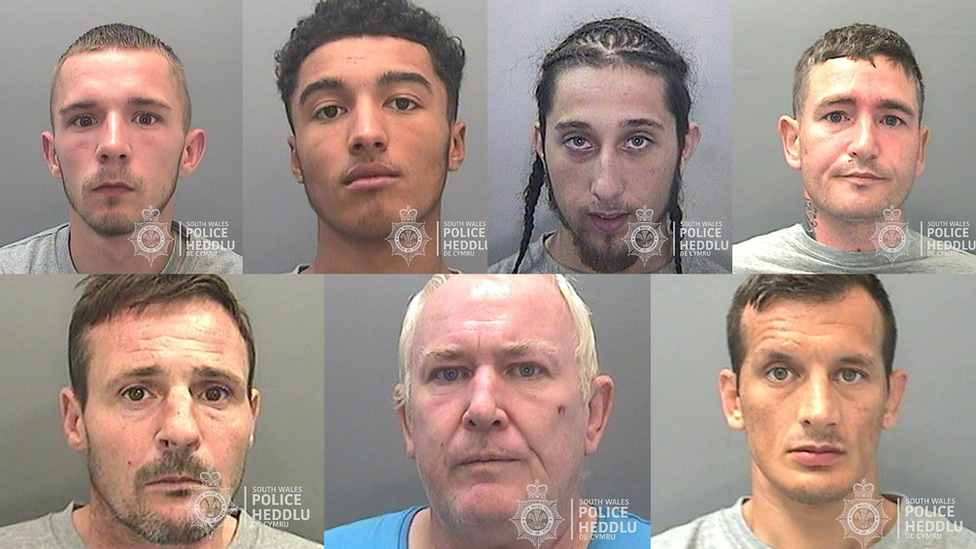
Top: (l-r) Leon Clifford, Brandon Liversidge, Leon Symons, Peter McCarthy; Bottom: (l-r) Raymond Thompson, Lewis Evans, Ryan Palmer
Clifford, Symons and McCarthy were all sentenced to life in prison. Symons will serve 28 years before being considered for release, while Clifford will serve 27 years and McCarthy 23.
Liversidge was detained at Her Majesty's pleasure because he was under 18 at the time but will have to spend at least 20 years in custody.
Raymond Thompson, 48, Ryan Palmer, 34 and Lewis Evans, 62, also all from Barry, who were convicted of manslaughter by the jury at Newport Crown Court at the same time will serve six, 11 and four years respectively.
Harry's mother, Emma Baker, said in a victim impact statement: "To lose your child in such traumatic and violent circumstances is too hard to bear".
Harry had been ambushed in a street after the gang had determined he "should die, or at the very least suffer really serious harm" after straying into their drug-selling patch.
He was chased through Barry for a mile before being caught in a compound at the docks and repeatedly stabbed.
Sentencing, Mr Justice Picken said: "[Harry Baker] did not deserve to die and his death is as tragic and unnecessary as that of anybody who is murdered, and I make that abundantly clear."
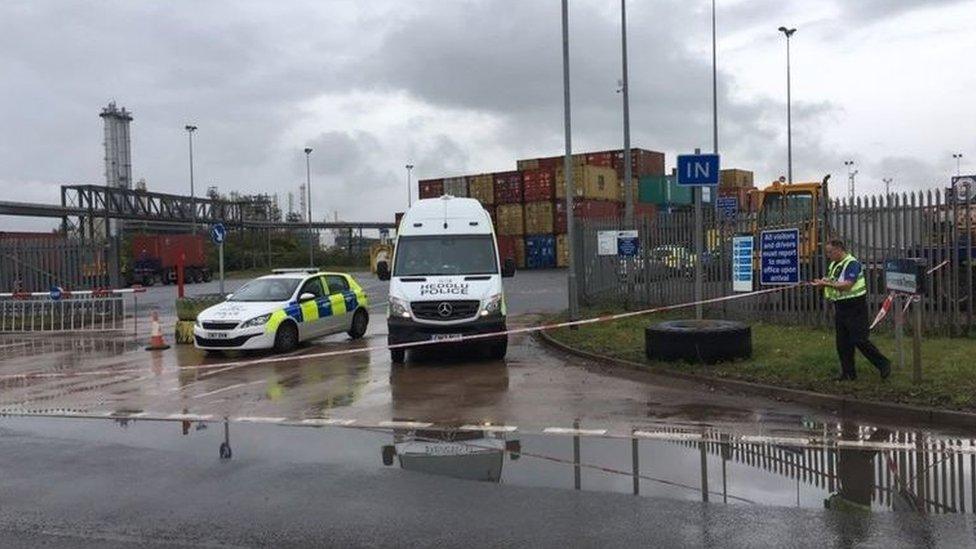
Harry Baker's body was found at a compound in Barry Docks in August 2019
The case is one of the largest multi-handed murder trials the Crown Prosecution Service in Wales has dealt with.
Brandon Liversidge was a rival drug dealer who led the chase of Harry Baker and was 16 when he stabbed him to death.
However, Harry was not a stranger to Liversidge. The court heard they knew each other, attended the same parties and followed each other on social media.
The court heard Liversidge started drug dealing while in school.
'Too hard to bear'
Harry Baker's mother read a victim impact statement in court, saying the seven killers had "changed the course of our lives forever".
Mrs Baker said reading the statement was one of the last things she could do for Harry.
She said: "To lose your child in such traumatic and violent circumstances is too hard to bear".
She said they were a normal family, with normal structured lives who were not prepared for this.
Emma Baker spoke outside the court before dozens of balloons were released into the sky
When Harry was 16 "he found a different life with different friends and we felt powerless to change these things".
She said: "We were aware Harry was involved in the world of drugs, but we did not know how deeply."
Mrs Baker said the last message she sent to Harry ended with the words, "love you Harry miss you".
Harry was taken away in a "cruel and barbaric way".
Being involved in drugs is "glamorised", and "Harry somehow got sucked into the lifestyle and could not find a way out", she said.
She would never see him grow up, get married and have children of his own.
"There have been times during both trials when I have been completely overwhelmed with emotion and had to leave the court," she said.
The defendants tried to make direct eye contact with her during the first trial, which was halted because of Covid, and she found this "intimidating".
She will now have to "face the reality, that my son is gone", but has "some comfort" knowing his killers will be in prison and will not have to put another family through this.
She said: "They took a normal family of four and destroyed us all. There will always be a place missing at the diner table."
A statement read on behalf of Mr Baker said: "I still cry every day."
Speaking outside court after sentencing, Mrs Baker said: "These so-called men, who have killed my son, have robbed him of the chance to turn his life around.
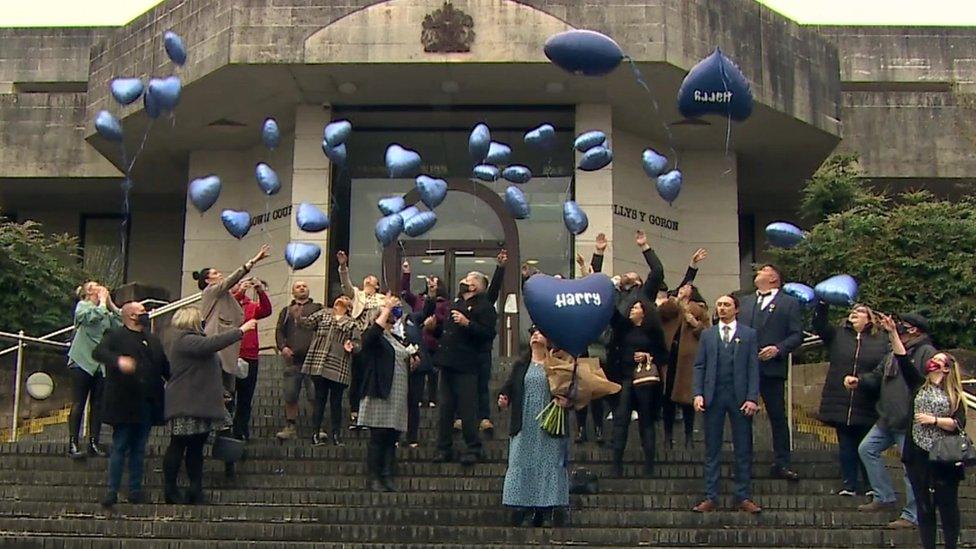
Harry Baker's family released balloons in his memory on the steps of the court
"Harry knew he had started to go down the wrong path and he knew he was out of his depth, but he was young.
"He had a family who love him dearly and he could have fixed his mistakes and chosen the right path. Sadly he will never get the chance."
She said Harry was "so much more" than the person he had been portrayed as, and she added:: "Harry, we will for ever be grateful that you are our son and we'll treasure the memories we have together as a family.
"Harry, you will forever be our sunshine."
Senior investigating officer Det Chief Insp Andy Miles said no sentence would ever be long enough for those responsible, adding: "Harry was robbed of his future and an opportunity to turn his life around, and his family and friends have been robbed of a much-loved son, brother and friend.
"They have shown tremendous strength and dignity throughout the investigation and subsequent court proceedings and our sympathies remain very much with them as they now try to begin rebuilding their lives."
What are the defendants' backgrounds?
The court was told about the previous offending of Harry Baker's killers.
Leon Clifford, 23, has five previous convictions for eight offences including affray, possessing an offensive weapon in a public place, assault occasioning actual bodily harm and possessing heroin with intent to supply.
Leon Symons, 22, has 12 previous convictions for 18 offences including burglary and theft, possession of controlled drugs, heroin and possessing a blade.
Peter McCarthy, 38, has 25 conviction for 65 offences dating back to 1997, including for robbery, taking a vehicle without consent, affray, possessing heroin with intent to supply and a house burglary.
Brandon Liversidge, 17, has no previous convictions, reprimands or cautions.
Raymond Thompson, 48, has 74 previous conviction for 166 offences dating back to the 1980s for dishonesty, burglary, theft, handling stolen goods, escaping from custody at Cardiff Crown Court, using threatening words and behaviour, possession of drugs and possessing an offensive weapon in a public place.
Ryan Palmer, 34 has 48, previous convictions for 77 offences dating back to the late 1990s for dishonesty, taking vehicles, using threatening language, burglary, criminal damage, handling stolen goods and possessing heroin with intent to supply.
Lewis Evans, 61, has one previous conviction for two offences, making false statements to obtain benefits and a caution for bigamy and common assault.
Are drug-related murders rising?
Kelly Huggins, district crown prosecutor for the Crown Prosecution Service in Wales, and the person responsible for the convictions in the Harry Baker trial told BBC Wales she was seeing "significantly more" violent crime linked to drugs.
What is "county lines"?
She said: "From my experience we are having significantly more knife crime come before the courts, more murders that have occurred as a result of knife crime. They do appear from my experience to have drugs at the heart of them."
She also said the Harry Baker case highlighted the dangers of becoming involved in that world.
"I think the message is there's no type, it can attract any person, from any background and of any age, you don't have to be a type to fall victim or be lured into this world. It can happen at any juncture in your life unfortunately," she said.
According to Office for National Statistics data, the number of murders increased in three of the four police force areas in Wales in the year up to March 2020.
Murders roughly doubled in the South Wales and Dyfed-Powys force areas in that period, and tripled in the Gwent force area, but that is from a low base, a rise from two homicides to six.
Murders in the North Wales force area in that period remained the same, at four homicides.
Office for National Statistics (ONS) data shows the number of murders in Wales and England involving drug users or dealers, or related to drugs in any way have increased steadily in the decade to March 2020, to 48 homicides.
Related topics
- Published15 March 2021
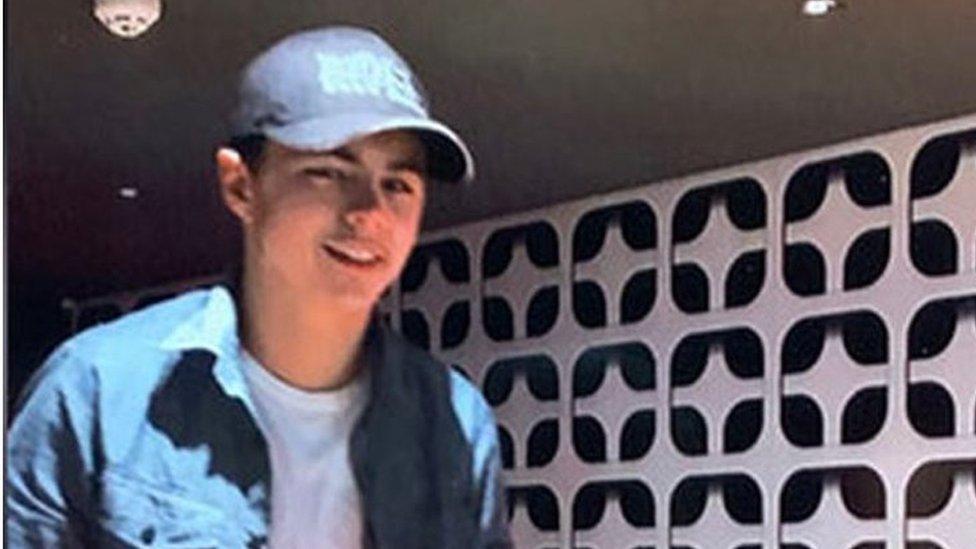
- Published15 March 2021
